CMD Special Report: ALEC's Gun Agenda Flourished with Koch Industries on Board, as with other Koch-Funded Groups (Part Two)
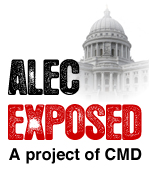 PART TWO: ALEC's Extreme Gun Agenda Was No Secret Since Koch Joined its Board
PART TWO: ALEC's Extreme Gun Agenda Was No Secret Since Koch Joined its Board
A new examination of the gun agenda of the American Legislative Exchange Council (ALEC) reveals numerous extreme bills advanced on the watch of Koch Industries as a leader and funder of ALEC. Koch has had a seat on ALEC's board for almost two decades, as many NRA bills became ALEC's "policy" and priority. An exploration of other entities funded by David or Charles Koch shows that this is no outlier and that other Koch-fueled organizations have also helped advance the NRA's efforts in a variety of ways.
This new information is in addition to newly discovered documents showing that Koch Industries had a seat on ALEC's "Public Safety and Elections Task Force" alongside the NRA in 2010 and 2011, and perhaps other years. (Part one of this special report detailing the extent of the gun agenda over the past two decades is available here.)
The Roots of the Romance between Koch and ALEC
The earliest reported reference connecting Koch to ALEC is almost two decades old. Although it is possible that the company, one of the Koch family foundations, or one of the brothers funded ALEC before then, there are no publicly available records tying Koch to ALEC before the 1990s. The Koch brothers were fueling other groups whose objectives overlapped with ALEC's in this period -- such as the CATO Institute and David Koch's predecessor to Americans for Prosperity, the inelegantly named Citizens for a Sound Economy, which also spawned the operation known as FreedomWorks.
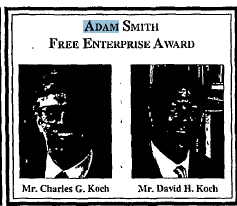 What is known is that in 1994, in Tampa, Florida, Charles and David Koch were singled out for ALEC's highest award for corporate titans, the "Adam Smith Free Enterprise Award."
What is known is that in 1994, in Tampa, Florida, Charles and David Koch were singled out for ALEC's highest award for corporate titans, the "Adam Smith Free Enterprise Award."
Perhaps ALEC's leaders did not read far enough into Smith's "Wealth of Nations" to see his admonition against the instruments of the free market getting involved in politics. Smith expressly urged that any law proposed by businesses "ought always to be listened to with great precaution ... It comes from an order of men, whose interest is never exactly the same with that of the public, who have generally an interest to deceive and even to oppress the public, and who accordingly have, upon many occasions, both deceived and oppressed it."
ALEC works to ensure that legislators do not simply listen to corporate interests but vote with them as equals on ALEC task forces. Critics like CMD note that through ALEC corporations get an equal "VOICE and VOTE" on model bills, including bills which deceive or oppress the public.
Charles, the CEO of Koch, gave an acceptance speech when he and his brother David received this award in person at ALEC's Florida meeting. No copy of his speech to ALEC is in the public record. At the time, ALEC said it was singling out the Kochs as "two of the nation's foremost advocates of the American free market system." ALEC's corporate board chairman, Ron Scheberle, then with GTE, a predecessor of Verizon, personally handed the award to David Koch. Scheberle is currently the Executive Director of ALEC.
The Kochs were known for the dramatic growth of the business they inherited from their father, Fred Koch -- a paranoid extremist who claimed the Supreme Court was communist and President Eisenhower was also suspect and who advanced the John Birch Society agenda against public education and teachers. In the process of taking a $260 million business in the late 1960s to a $20 billion corporation by 1994, Koch Industries had ripped off tribes in Oklahoma, as well as the American taxpayer, by routinely under-reporting the amount of oil pumped from fields. This dishonest practice, known as the "Koch Method," was denied by the corporation but a jury found evidence the company deliberately cheated, once the case finally made it to trial in 1999, resulting in a settlement.
Starting in the 1970s, the Kochs also started to invest in groups to promote their ideological agenda, which claimed the "free market" mantle as a way to call for the privatization of modern American innovations, like Social Security and public schools. Charles co-founded the CATO Institute, which began assailing Social Security in the 1970s, and he also funded academic programs to advance his ideological agenda at the University of Kansas and George Mason University. David ran unsuccessfully for Vice President in 1980 on a similar platform, and then he turned his attention to other ways to accomplish his agenda, such as through the group Citizens for a Sound Economy (CSE). As of the time ALEC gave its highest corporate award to the Kochs in 1994, David was on the Board of the Reason Foundation and CATO, and was Co-Chairman of the Board of CSE.
The Kochs "Personify" the ALEC Agenda?
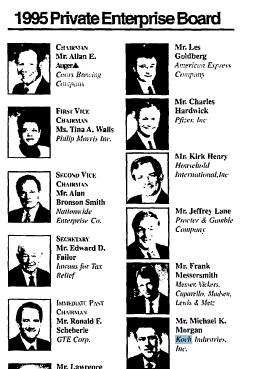 ALEC has described the Adam Smith award as going to the corporate CEO who "personifies ALEC's commitment to free-market and pro-growth economic policies." ALEC created this award to help bring some of the richest men and women in the world into its fold by giving them this made-up honor.
ALEC has described the Adam Smith award as going to the corporate CEO who "personifies ALEC's commitment to free-market and pro-growth economic policies." ALEC created this award to help bring some of the richest men and women in the world into its fold by giving them this made-up honor.
Sure enough, the year after the Koch Brothers received the award, Koch Industries was listed as a member of ALEC's corporate board for the first time. In 1995, Koch Industries became a corporate leader of ALEC alongside Allan Auger of Coors Brewing Company, who was the chairman of ALEC's board. Heirs to the Coors fortune -- Holland (Holly) Coors, Jeffrey Coors, and Peter Coors -- received the Adam Smith Award the year after the Kochs. (Jeffrey also served as the Chairman of the Board of another group like ALEC co-founded by Paul Weyrich, the Free Congress Foundation.)
The Kochs received ALEC's Adam Smith Award the year after the honor was inaugurated and awarded to Jay Van Andel and Richard DeVos of the Amway fortune. (The DeVos family continues to fund an array of efforts to change U.S. law in ways that ALEC advances, especially in the effort to corporatize American public schools through Betsy DeVos' funding of various groups.)
ALEC's Gun Agenda since Koch Joined Board
Although Koch Industries has sought to distance itself from ALEC's gun agenda, the facts tell a different story, as it is one of several corporations that helped fund and lead the organization while that organization advanced numerous extreme bills and resolutions on the NRA's wishlist.
ALEC has repeatedly noted that only the public sector members of its board can vote to approve model bills, even though ALEC's corporate members vote on bills through its task forces. However, there is no indication in any public record that at any time in the past 17 years since Koch has had a seat on its corporate board that the company or its representatives objected to any of the extreme gun legislation being advanced by ALEC, prior to the tragedy of Florida high school student Trayvon Martin being shot and killed by George Zimmerman. Koch was also the chairman of ALEC's corporate board for a number of years while ALEC's gun agenda continued to advance. And, an untold sum of Koch Industries and Koch family foundation money has also funded ALEC operations over the past nearly two decades.
Barring Cities from Suing Gun Manufacturers
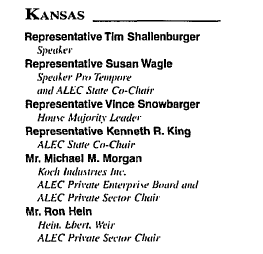 In 1995, after Koch Industries joined ALEC's board in the person of Michael M. Morgan of its government affairs shop, ALEC issued its annual legislative scorecard touting its success in having its model bills introduced or enacted in state legislatures that spring. ALEC noted that its crime task force had the most bills echoing the ALEC agenda introduced, 199 bills in all that year.
In 1995, after Koch Industries joined ALEC's board in the person of Michael M. Morgan of its government affairs shop, ALEC issued its annual legislative scorecard touting its success in having its model bills introduced or enacted in state legislatures that spring. ALEC noted that its crime task force had the most bills echoing the ALEC agenda introduced, 199 bills in all that year.
One of the bills highlighted by ALEC in its legislative scorecard for 1995 was the "Consistency in Firearms Regulation" Act. This bill would bar cities from enacting their own gun regulations and would prevent cities from suing the gun industry. This ALEC bill had passed in Georgia and Utah that year, and it had been introduced in eight other states.
Kansas was one of the states where the NRA's effort to bar cities from suing gun manufacturers was introduced in 1995.
Who was one of the private sector co-chairs for ALEC's agenda in Kansas in 1995? Koch Industries, as represented by Morgan.
There is no indication Morgan lobbied in the Kansas State House for that ALEC bill and there are no public records indicating that he tried to stop this part of the ALEC agenda spearheaded by the NRA from becoming binding law in Koch Industries' home state, which it ultimately did.
A Bounty of ALEC Gun Bills in the mid-1990s, such as Opposing the Assault Weapons Ban
When Koch became a leader of ALEC back in 1995, ALEC's publications also proudly touted its gun agenda and the Second Amendment right to bear arms, in contrast to ALEC's recent attempts to distance itself from this agenda.
 That year, ALEC opposed efforts to ban "assault weapons," through its resolution on "semi-automatic" firearms, which was disseminated that year. In that ALEC resolution, the organization acknowledged the bar on machine gun sales in existence since 1934. This stands in sharp contrast to the ALEC Public Safety and Elections Task Force amendments at its meeting in Arizona last winter where the NRA obtained unanimous support from its corporate and lawmaker members for revising the Consistency in Firearms Regulation Act to expressly bar cities from banning "machine guns."
That year, ALEC opposed efforts to ban "assault weapons," through its resolution on "semi-automatic" firearms, which was disseminated that year. In that ALEC resolution, the organization acknowledged the bar on machine gun sales in existence since 1934. This stands in sharp contrast to the ALEC Public Safety and Elections Task Force amendments at its meeting in Arizona last winter where the NRA obtained unanimous support from its corporate and lawmaker members for revising the Consistency in Firearms Regulation Act to expressly bar cities from banning "machine guns."
In 1995, ALEC also promoted as model legislation a bill that would create state-based criminal background checks for firearms purchases different from the federal Brady Handgun Violence Prevention Act, which established the National Instant Check criminal background check system at the FBI. ALEC's bill expressly exempts firearms sales at gun shows from its background checks (creating a "gun show loophole"). It also exempts holders of "concealed carry" permits from a background check, but the federal provisions attempt to protect the public regardless of whether a person had previously obtained a permit to carry a gun, such as fugitives and persons adjudicated to be mentally unstable.
Blocking City Suits Against Gun Manufacturers, Again, but Now with Koch as Corporate Chair
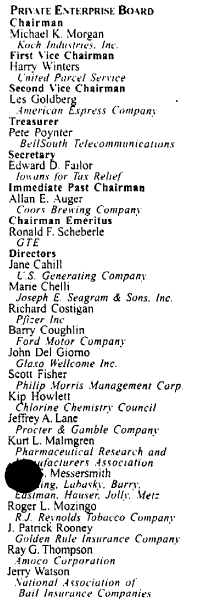 ALEC Corporate Board (1999)In 1996, ALEC reported to the legislators and corporations on its joint board that it was in a financial crisis, needing a half-million dollars immediately and over a million dollars in the near term to remain in existence. In 1997, the Kochs gave ALEC a loan for $430,000. That year, Koch Industries became the First Vice-Chairman of ALEC's private sector board, second in its leadership behind Coors.
ALEC Corporate Board (1999)In 1996, ALEC reported to the legislators and corporations on its joint board that it was in a financial crisis, needing a half-million dollars immediately and over a million dollars in the near term to remain in existence. In 1997, the Kochs gave ALEC a loan for $430,000. That year, Koch Industries became the First Vice-Chairman of ALEC's private sector board, second in its leadership behind Coors.
In 1999, ALEC reaffirmed its commitment to the "Consistency in Firearms Regulation" bill that had been part of the ALEC playbook for years and that had been introduced in Koch Industries' home state of Kansas, when Koch Industries was state co-chair, and elsewhere. Notably, the preceding year, the City of New Orleans had filed the first municipal lawsuit against gun manufacturers, and other cities soon followed.
Who was the chairman of ALEC's governing corporate board? Koch Industries, represented by Morgan, was the chairman that year. (The list of corporate leaders from that year, 1999, is shown on the right.)
Opposing Gun Manufacturer Codes of Conduct That Protect Kids and Prevent Gun Crime
In 2000, ALEC adopted the "Defense of Free Market and Public Safety Resolution," as a national template for states across the country. That resolution was an effort to thwart law enforcement from using contracts to buy firearms for police officers to favor gun manufacturers that adhered to a code of conduct. Smith & Wesson (S&W) had become the first gun manufacturer to settle one of the municipal lawsuits.
Part of that settlement included requiring its retailers to sell all of its handguns with mechanical trigger locks to help protect kids from accidentally killing themselves or others. The settlement also penalized S&W retailers whose sold guns tended to end up used in crimes, barred S&W retailers from using the gun show loophole to avoid conducting criminal background checks on prospective buyers, and forbade dealers from releasing more than one handgun to a purchaser per day.
ALEC's resolution sought to bar states from rewarding S&W with contracts for police weapons or creating an incentive for other gun manufacturers to adopt similar voluntary codes of conduct.
Who was the chairman of ALEC's corporate board in 2000? Koch Industries.
Koch continued as ALEC's corporate chairman in 2001 and 2002, until PhRMA became the chairman of the board in 2003. With the Bush Administration in the White House and the nation dealing with the aftermath of the attacks of September 11th, gun legislation was not on the front burner in those few years.
ALEC Pushes Concealed Carrying of Guns Across the States and the "Stand Your Ground"/Castle Doctrine
After the presidential election year in 2004, ALEC chose to bills to expand the rights of gun owners with concealed carry permits, with bills to require reciprocity among states.
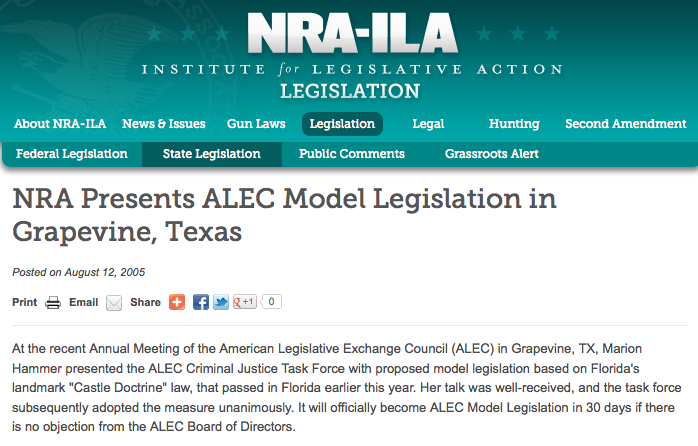 Meanwhile, the NRA chose to advance the so-called "Castle Doctrine" bill to create legal immunity for shooters claiming self-defense, beyond the reach of the traditional rights of self defense (which is the original "castle doctrine" that a person does not have a duty to retreat if confronted with deadly force in his or her "castle").
Meanwhile, the NRA chose to advance the so-called "Castle Doctrine" bill to create legal immunity for shooters claiming self-defense, beyond the reach of the traditional rights of self defense (which is the original "castle doctrine" that a person does not have a duty to retreat if confronted with deadly force in his or her "castle").
As CMD's PRWatch documented, the NRA's lobbyist Marion Hammer pushed this bill, which came to be known as "Stand Your Ground," through the Florida legislature in early 2005. She then brought the law to the closed door ALEC task force meeting in Texas that summer to become a "model" for other states. Her pitch was warmly received and "unanimously" adopted by the private and public sector members at that meeting. The list of corporate reps attending that meeting is not publicly available, other than the fact that Wal-Mart (the nation's largest retailer of long guns and ammunition) was the co-chair of that task force.
In 2005, Koch Industries continued in its leadership role for ALEC as a corporate board member.
Punishing Cops for Disarming People in Responding to Disasters like Hurricane Katrina
After the natural disaster of Hurricane Katrina in 2005 and the manifold failures of the Bush administration's emergency response team, stories arose that some guns were seized in the effort to restore order to the chaos that emerged during the disastrous storm and its more disastrous aftermath. In 2006, ALEC passed a resolution that would subject law enforcement officers to up to 10 years in jail if they seized firearms during an emergency like that natural disaster. Under ALEC's model, cops could also be sued for seizing guns, even in an effort to restore public order, and could lose their jobs for doing so.
ALEC publications from that year also touted the introduction and passage of the SYG/Castle Doctrine model bill in other states. Koch Industries was on ALEC's corporate board in 2006.
Arming Kids on College Campus after a Disturbed and Armed College Student Massacred His Peers
In 2008, in the aftermath of the tragic massacre of students and teaches by a heavily armed Virginia Tech student in 2007, ALEC adopted a model bill to remove prohibitions of guns on college campuses and even to allow college students to have concealed carry permits to allow them to bring guns to class.
Also that year, ALEC sought to weigh in on the pending Supreme Court case called McDonald v. Chicago, filed to challenge the handgun ban in the city of Chicago and elsewhere. The organization filed an amicus brief in a U.S. Supreme Court case on the same side as the NRA.
Later that year, at the American Conservative Union's CPAC meeting, the NRA's Cam Edwards interviewed Michael Hough, ALEC's "Public Safety and Elections Task Force" director/staffer, to discuss "ALEC's strong relationship with the NRA and explain the support of gun rights and ownership." Hough told listeners that ALEC worked "with our partners, the National Rifle Association" on the brief. As noted by CMD's PRWatch, Hough also described the fruitful relationship between ALEC and the NRA on issues like the SYG/Castle Doctrine model bill, stating:
"Some of the things that we were pushing in states was the 'Castle Doctrine,' we worked with the NRA on that. That's one of our model bills we have states introduce and another one was the Emergency Powers legislation, which was enacted in a couple states, including some liberal states that normally don't give us anything. Like California, for example, where now you have on the law there where the governor can't come in and take your guns in an emergency, like we saw in Louisiana and some other states."
In 2008, Koch Industries remained steadfastly on ALEC's corporate board of directors. It also held a seat on ALEC's corporate board in 2009.
Koch Joins ALEC's Public Safety and Elections Task Force, Co-Chaired by the NRA; Last Year ALEC Said Cities Should Not Be Able to Bar Even "Machine Guns"
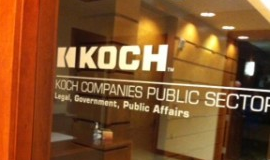 It is not clear when Koch first joined ALEC's crime task force because the public record is incomplete. What is known is that the first time a full roster of that task force becomes publicly available, Koch is listed as a private sector member of that task force in 2010 (as noted here). The NRA was the task force's co-chair.
It is not clear when Koch first joined ALEC's crime task force because the public record is incomplete. What is known is that the first time a full roster of that task force becomes publicly available, Koch is listed as a private sector member of that task force in 2010 (as noted here). The NRA was the task force's co-chair.
In 2011, Koch is also listed on the roster of that task force. That same year, the NRA introduced amendments to expand the reach of the ALEC model bill on "Consistency in Firearms Regulation," to expressly stop cities from barring "machine guns" and "submachine guns." There is no public record, one way or the other, indicating whether Koch's reps attended that meeting and joined in the unanimous support the NRA's amendments received from the task force's private sector members in those closed door meetings.
In 2010 and 2011, Koch also remained on the corporate board of ALEC, a position it continues to hold through the present day.
The Koch-Funded ALEC Is Not Alone Among Koch-funded Groups that Push NRA Views or Work with the NRA
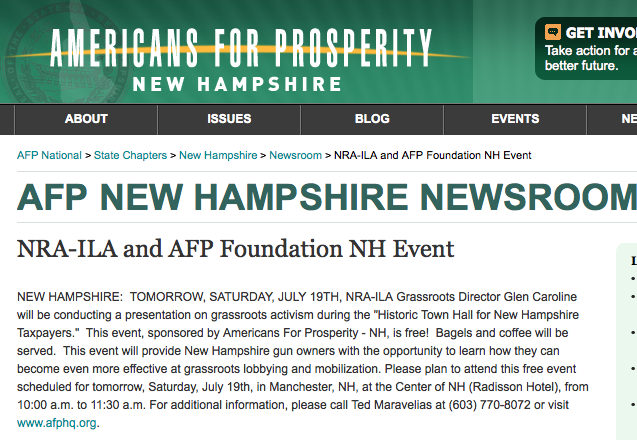 ALEC is not the only group funded by Koch corporate money or the Koch family fortune that has pushed the NRA's positions on guns.
ALEC is not the only group funded by Koch corporate money or the Koch family fortune that has pushed the NRA's positions on guns.
For example, the CATO Institute, which was co-founded by Charles Koch, and in which David and Charles Koch have been embroiled in recent efforts to expand their control, has issued numerous papers siding with the NRA's view on guns in ways that echo ALEC's affinity for the NRA as well. Similarly, the Reason Foundation, where David Koch sits on the board, also has produced numerous articles favoring the NRA's position on guns through its Reason magazine. There is no public record showing whether the Kochs urged or opposed this work.
Additionally, the Institute for Humane Studies, which Charles Koch has long advanced and funded, routinely offers students the opportunity to become a "Charles G. Koch Summer Fellow" and intern at one of a network of groups on "gun control/Second Amendment" issues, if the student makes it through the screening process to assure his or her right-wing bona fides.
Americans for Prosperity, which is chaired by David Koch, has also worked with the NRA to train and mobilize gun owners.
Koch Denies Role in Controversial SYG But Didn't Try to Stop It or Other Parts of the NRA Agenda Pushed by ALEC Year after Year
Koch Industries notes that it "has no involvement whatsoever with the defense of George Zimmerman, the defendant in the Trayvon Martin case."
Its legacy tells a more complex story. In myriad ways over almost two decades, Koch has bankrolled ALEC's operations and led ALEC as a board member while ALEC advanced as "model" bills numerous extreme gun laws, including one based on the SYG law invoked by Zimmerman's defenders.
Of course, that is only one part of the ALEC agenda, which includes tax breaks for corporations and efforts to undermine holding corporations accountable in litigation and through regulations. But, as ALEC's Michael Hough noted, the NRA partnership is part and parcel of what ALEC has stood for over many years, just as the NRA has loudly complained following its exile last month. With the public abandonment of the task force the NRA helped lead, ALEC's annual meeting in Salt Lake City in July may be the first one in decades without an NRA-sponsored shooting event for ALEC board members, task force members, and other guests. But, neither ALEC nor the corporations that have funded it are doing anything to undo the damage done by the gun laws their financial support of ALEC have helped become law.
The NRA's legislative agenda on guns through ALEC is one that Koch funding helped make real, and there is no public evidence that the company or its leaders objected to any of the bills pushed by the NRA through ALEC during Koch's tenure and leadership on ALEC's board.
Lisa Graves is Executive Director of the Center for Media and Democracy (PRWatch.org and ALECexposed.org). She formerly served as Deputy Assistant Attorney General in the Office of Legal Policy at the U.S. Department of Justice where she handled gun policy and was the Managing Editor of the National Integrated Firearms Violence Reduction Strategy. She also served as the Chief Counsel for Nominations for the U.S. Senate Judiciary Committee, as Deputy Chief of the Article III Judges Division of the U.S. Courts, and as an adjunct professor of law.




